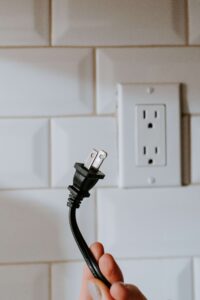
To avoid getting shocked even when the breaker is turned off, it’s important to know what other factors can cause an electrical current to flow. Read on down below
3 Reasons Why You Still Get Shocked Even With Your Breakers Turned Off
1. Your Breakers Are Not Labeled Properly
This is perhaps the most common cause of electrical shocks due to breakers. Before attempting to fix any electrical problem, you should always use a properly functioning electrical testing tool instead of trusting that the breaker would keep you safe, especially ones that have not been labeled properly.
It’s possible that the breakers have been incorrectly labeled, and that if you turn them off you’ll still get a severe electric shock. However, a voltmeter will come in handy if you intend to purchase any circuits that are either incorrectly labeled or lack labels altogether. Knowing the precise voltage is much easier with a contact voltmeter than with a non-contact voltmeter, which rarely gives accurate readings.
2. You’ve Got Some Loose Wiring
When a circuit breaker continues to shock after being turned off, loose wiring connections may be the culprit to blame. Getting shocked is a real possibility if the main breaker has any loose wires that allow current to leak from it to the other breakers. You should double-check the terminal voltages and the wiring before touching the breakers. Look at the screws, too.
You need to call an electrician if there is still voltage present and you can’t find the source. To be extra cautious, you can also switch your home’s main power supply to “standby” mode.
Some problems require the attention of trained experts, regardless of how much experience you have in the field. They will resolve the issue faster and more securely than you could on your own.
3. There’s A Short Circuit Somewhere That You Haven’t Found Yet
You can still get shocked if you try to turn off the main breaker while working on the other breakers, especially if there is a short circuit in the main breaker. If a live wire touches a grounded or neutral wire, the result is a short circuit. There is an overabundance of current when the live and neutral wires are joined.
Because of this, the breaker overheats and eventually trips due to the excessive current flowing through it. In such a situation, switching off the main breaker is not sufficient. An electrician’s expert services are required.
At its best, a ground wire will not be conducting any electricity. A connection to the hot or neutral, however, causes it to conduct electricity. So, be careful not to touch the ground wire while switching off the main breaker.
So How Do You Make Sure Your Breakers Are Safe To Handle When Turned Off?
The answer is simple. You need to have your home electrical system examined by a professional. Get in touch with a highly qualified electrician at Elcon Electric today.

